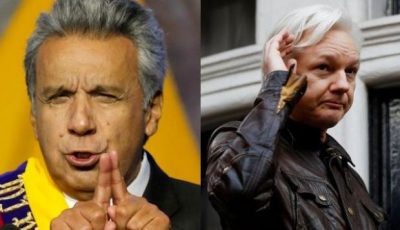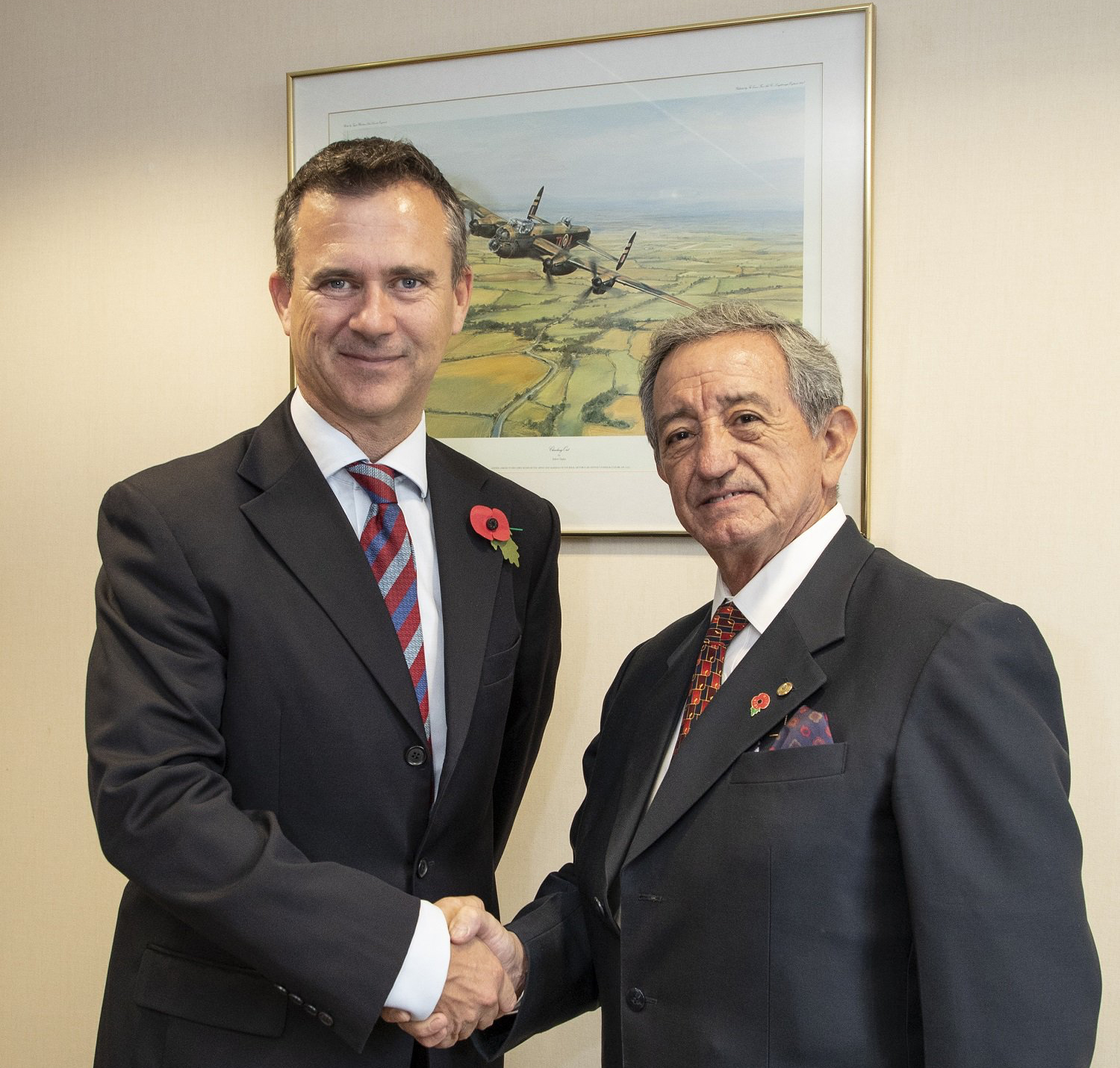Revealed: The UK Government Campaign to Force Julian Assange from the Ecuadorian Embassy
A wide-ranging UK government campaign was brought to bear on Ecuador to press it to hand over WikiLeaks publisher Julian Assange, new information reveals.

All Global Research articles can be read in 51 languages by activating the “Translate Website” drop down menu on the top banner of our home page (Desktop version).
***
The UK government paid £8,330 in November 2018 to bring Ecuador’s defence minister Oswaldo Jarrín to Britain, two months before the planned seizure of Julian Assange from the Ecuadorian embassy in London, it can be revealed.
It is unusual for foreign ministers to have their trips to the UK paid by the British government, and the week-long visit came after prime minister Theresa May had been told to “butter up” Ecuador’s president, Lenín Moreno, in order to get Assange expelled from the embassy.
The new information comes from UK Foreign Office documents released to Declassified, as well as the recently published diaries of former foreign office minister, Sir Alan Duncan, who was a key player in the Assange negotiations.
The documents note that “the main objective” of the November 2018 visit was Jarrín’s “participation” at an annual national counter-terrorism exercise that rehearses the government’s response to a major terrorist attack.
The exercise is organised by the Office for Security and Counter-Terrorism, a part of the Home Office which “oversees the Security Service [MI5] and police counter-terrorism operations in the UK”.
It is unclear why Ecuador’s defence minister was chosen to attend a counter-terrorism exercise as the South American nation is not a target of terrorist groups.
Image on the right: British Armed Forces Minister Mark Lancaster (left) meets Ecuador’s Defence Minister, Oswaldo Jarrin, in the UK, 7 November 2018. (Photo: UK Ministry of Defence / Twitter)

The documents note that “one of the main meetings” was with then armed forces minister Mark Lancaster, after which the Ministry of Defence reported the two countries were “strengthening our ties”.
Jarrín also visited the Foreign Office’s “crisis centre” and met with the head of UK Export Finance, Louis Taylor.
Partner of choice
Two months before Jarrín’s visit, in September 2018, the UK government had spent another £12,806 facilitating a three-day visit by Ecuadorian officials concerned with fighting corruption and money laundering in the country.
The evaluation of the trip noted that it helped the UK government to “build strong relationships” and that “the UK was subsequently commended as a partner of choice to President of the Republic [Lenín Moreno]”.
A Foreign Office spokesperson told Declassified:
“The Foreign Office regularly arranges meetings with ministers and officials from other countries to encourage closer engagement with our international partners and help achieve our foreign policy objectives.”
She added:
“As part of this work, some of the costs of these visits are occasionally covered by the Department or by Posts. These are carefully considered on a case by case basis, and only when resources are available.”
British security officials also visited Ecuador in the build-up to Assange’s exit from the embassy, government records show.
In July 2018, Philip Barton, then director general of security at the Foreign Office, flew to Ecuador for “short notice bilateral meetings” with its foreign ministry. A week after his return he travelled to Cheltenham for “meetings at GCHQ”, the UK’s largest intelligence agency, government travel logs show.
Then, two weeks before Assange was expelled from the embassy, on 27 March 2019, Britain’s then deputy national security adviser for intelligence, Richard Moore, spent £4,469 on a business-class flight to Ecuador, the logs show.
Moore was appointed chief of MI6, Britain’s external intelligence agency, just over a year later. Barton now runs the Foreign Office.
Delayed expulsion
The two British-funded trips for Ecuadorian officials came as the government was ramping up efforts to get Ecuador to rescind the asylum it had granted Assange in 2012 to avoid persecution by the US government.
Until now, the nature of these negotiations has remained mostly secret, and freedom of information requests relating to the Assange case and the role of British ministers are routinely blocked.
But the diaries of Sir Alan Duncan, who led the Assange negotiations as UK minister for the Americas, shed light on the pressure Britain brought to bear on Ecuador after the new government of Lenín Moreno assumed power in May 2017.
Moreno quickly undid most of the policies of his leftist predecessor Rafael Correa and aligned himself with the US, signing deals with the International Monetary Fund and making obvious his annoyance at Assange’s continued asylum at the country’s embassy in London.
In 2016, Duncan had met Correa’s foreign minister Guillaume Long who was still committed to upholding Assange’s right to asylum. An exasperated Duncan lamented in his diaries that Long “defends the supposed human rights of Julian Assange”.
But by March 2018, with the Moreno administration in place, Duncan was more hopeful and had a one-on-one meeting with prime minister Theresa May where he “updated her on Ecuador and Assange”. “She might want to butter up President Moreno”, he wrote.
Two weeks later, he added:
“I think I am nearly there with Ecuador to get Julian Assange out of their London embassy. It’s taken months of delicate negotiations, but nearly nearly…”
Six months later, in September 2018, Duncan had a call with Ecuador’s new foreign minister José Valencia.
“We both want Assange out of the embassy,” he wrote, “but the Ecuador government won’t quite yet take the necessary final step for fear of the domestic reaction.”
In the background, negotiations were clearly taking place which are not mentioned in Duncan’s diaries. In October 2018, Duncan noted:
“The Assange issue is progressing. Our channels into Ecuador are paving the way to a solution.”
Then, on 8 January 2019, Duncan wrote:
“Annoyingly Assange’s forcible exit from the Ecuadorian embassy has been delayed. Ecuador’s government lawyers are now saying that it requires a Presidential decree which will take at least a week or two.”
Later on that day, Duncan went to the House of Commons to meet the new Ecuadorian Ambassador Jaime Marchán-Romero.
“His principal mission is to get Assange out of the embassy — it has been six years — and although he had been aiming for tomorrow, as I’d just learnt it’s going to take longer. A tad frustrating, but we’ll get there”, Duncan wrote.
After this meeting, he “updated” then foreign secretary Jeremy Hunt on the situation.
Operation Pelican
Duncan’s annoyance that Ecuador had delayed expelling Assange increased the following month when he wrote:
“Internal meeting on Ecuador, who have gone quiet on pushing Assange out of the embassy despite saying it was going to happen on 9 January.”
He added:
“It looks as though their Foreign Minister had said it would happen without explicitly telling the President. Assange is not mentally stable; he has been defecating in wastepaper bins… It is a disgusting situation. I insist we lay a clear paper trail tracking our constant demands that he be evicted”.
Soon after, he noted Ecuador’s ambassador “is determined to get Assange out of his embassy, but President Moreno requires a final push in order to be persuaded to press the button.”
After another meeting with the ambassador a fortnight later, Duncan noted: “We are so nearly there in getting Assange chucked out of the embassy.”
On 11 April 2019, the day Assange was finally seized by UK police, he wrote:
“Suddenly it’s game on: I’m told Assange will be sprung from the [Ecuadorian] embassy today. So I drop everything and head to the Operations Room at the top of the Foreign Office. Operation Pelican is go — suitably assisted by one official wearing a pelican-motif tie.”
In the Operations Room, Duncan watched a live feed when at 10am plainclothes policemen entered the embassy.
“We were expecting Assange to be brought out very soon after their arrival, but texts to the Ops Room revealed he had caused a bit of a commotion and had been screaming and bawling while edging towards the Ambassador’s office — at which point he was forcibly restrained”.
He continued:
“Then, with military precision, six police officers marched up to line up each side of the entrance steps, to form a protective corridor through which Assange was bundled out at about 10.20am.”
Duncan concluded:
“So, job done at last — and we take a commemorative photo of Team Pelican. It had taken many months of patient diplomatic negotiation, and in the end it went off without a hitch. I do millions of interviews, trying to keep the smirk off my face.”
Aftermath
Two days after Assange’s eviction, on 13 April, Duncan noted he “had put [Daily Mail journalist] Simon Walters in touch with Ambassador Marchán, thus giving the Daily Mail their scoop about the ‘fetid’ Assange hovel. The pictures of his living conditions were beyond repulsive.”
That day the Daily Mail ran a hit piece using photos from inside the embassy with apparently incriminating photos of unwashed plates in the kitchen. “Revealed, full squalid horror that drove embassy finally to kick him out”, the subtitle read.
The article alleged that Assange “left soiled underpants stuffed down the lavatory in a fit of rage”, but provided no evidence. Duncan’s allegations about Assange defecating in wastepaper bins from two months before were not included in the article.
Ten days later, Duncan met with Hugo Shorter, head of the Foreign Office’s Americas division. “We are both still basking in the successful release of Julian Assange”, he noted.
Then in mid-June 2019, with Assange having been incarcerated in Belmarsh maximum security prison for two months, Duncan put on a party.
“[S]traight to drinks in my office for all the Operation Pelican team, those who worked on the removal of Julian Assange from the Ecuador embassy”, he wrote.
“I gave them each a signed photo which we took in the Ops Room on the day, with a caption saying ‘Julian Assange’s Special Brexit Team 11th April 2019’.”
Later on that month, Duncan went on an official trip to Quito, Ecuador’s capital city, for “bilateral meetings” with President Moreno, according to government records. Duncan’s diary is empty for these days he was in Ecuador.
But the final reference to Assange in his diaries comes two weeks later, on 15 July 2019, when he is in Ecuador again for another meeting with President Moreno.
“Visiting him to say thank you is an essential conclusion to the Assange episode and he exudes goodwill and warmth. He loves the UK, and I gave him a beautiful porcelain plate from the Buckingham Palace gift shop. Job done,” he wrote.
Other UK officials were also re-engaging with Ecuador after Operation Pelican was completed. In May 2019, the month after Ecuador had expelled Assange, trade minister George Hollingbery flew to Quito to sign the UK-Andean Countries Trade Agreement, according to UK government records.
*
Note to readers: please click the share buttons above or below. Forward this article to your email lists. Crosspost on your blog site, internet forums. etc.
Matt Kennard is head of investigations at Declassified UK, an investigative journalism organisation that covers the UK’s role in the world.

